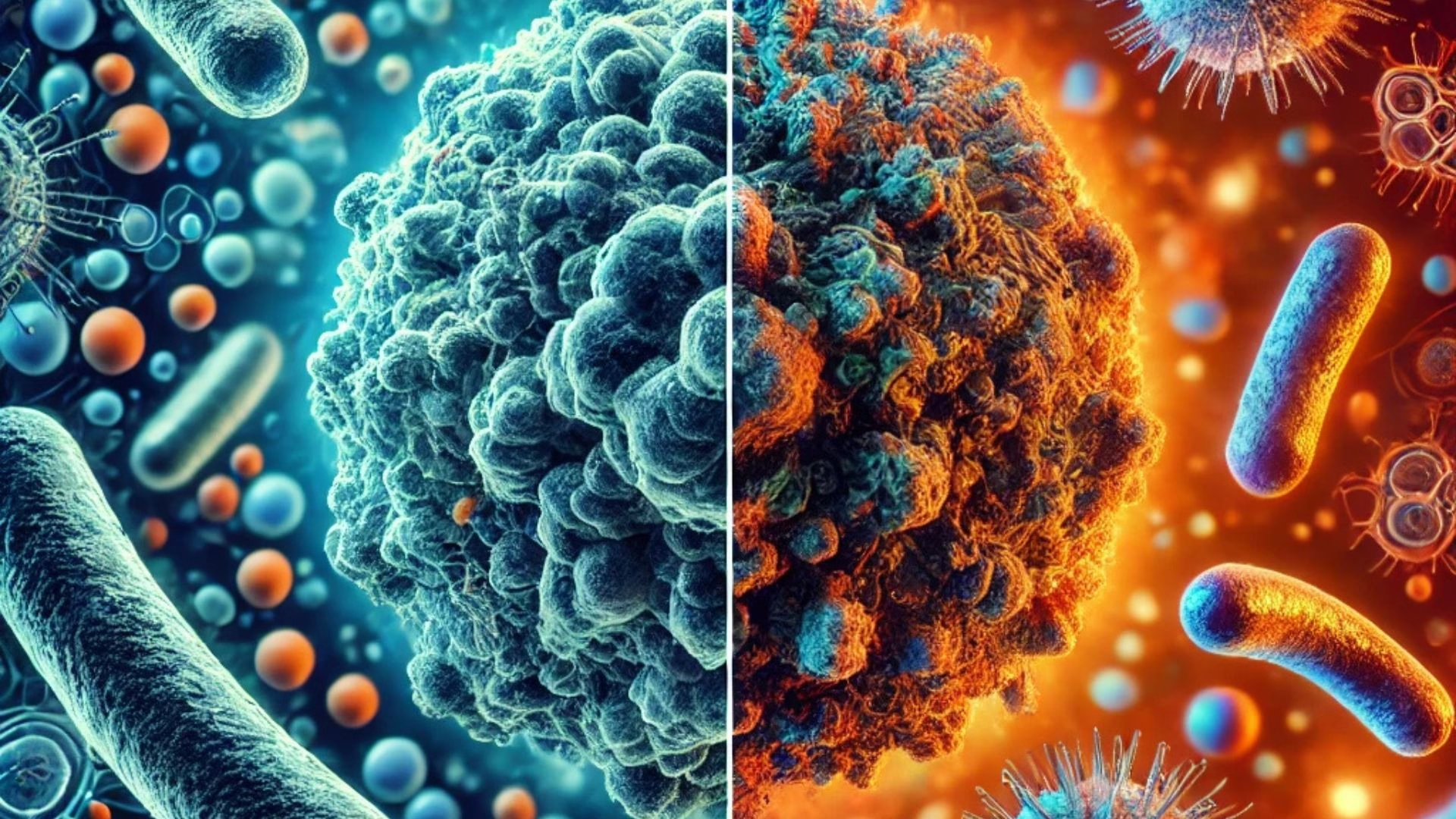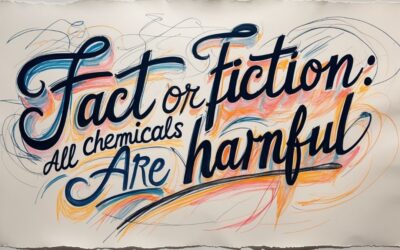- Podcast Episode
- Understanding Bacteria
- Harmful Bacteria: The Villains
- Beneficial Bacteria: The Unsung Heroes
- A Balancing Act: When Good Bacteria Turn Bad
- Myth-Busting: Bacteria and Cleanliness
- The Bigger Picture: Bacteria and Humanity
- Final Verdict: Are Bacteria Always Harmful?
- Let’s Talk
- Let’s Learn Vocabulary in Context
- Let’s Discuss & Write
- Let’s Play
Podcast Episode
When you hear the word “bacteria,” what comes to mind? For many, it’s images of infections, diseases, and the need for hand sanitizer. But is the belief that bacteria are always harmful fact or fiction? The truth might surprise you. While some bacteria can indeed cause harm, many others are essential for life as we know it. Let’s dive into the fascinating world of bacteria and uncover the truth.
Understanding Bacteria
Bacteria are single-celled microorganisms that exist virtually everywhere—from the soil to the ocean to the human body. They’re among the oldest forms of life on Earth, with a history dating back billions of years. While they are often associated with illness, bacteria come in countless varieties, many of which are not only harmless but incredibly beneficial.
Harmful Bacteria: The Villains
Let’s start with the bad guys. Pathogenic bacteria are the ones responsible for illnesses and infections. These bacteria invade our bodies, multiply, and disrupt normal processes. Common examples include:
- Escherichia coli (E. coli): Some strains can cause food poisoning and severe stomach issues.
- Streptococcus pyogenes: The culprit behind strep throat.
- Mycobacterium tuberculosis: The bacterium that causes tuberculosis, a serious lung infection.
- Salmonella: Often linked to foodborne illnesses.
These harmful bacteria can cause anything from mild discomfort to life-threatening conditions, highlighting the importance of good hygiene and proper medical care.
Beneficial Bacteria: The Unsung Heroes
Now, here’s where the story gets interesting. Not all bacteria are harmful; in fact, some are absolutely vital to our survival. Beneficial bacteria play essential roles in:
1. Human Health
Your body is home to trillions of bacteria, many of which reside in your gut. These good bacteria, collectively known as the gut microbiota, help with:
- Digestion: Breaking down food and producing nutrients like vitamins B and K.
- Immunity: Protecting against harmful pathogens and maintaining a healthy immune response.
- Mental Health: Research suggests a connection between gut bacteria and mood regulation, often called the gut-brain axis.
Probiotics, found in foods like yogurt and supplements, introduce beneficial bacteria into your system, improving overall health.
2. The Environment
Bacteria play a vital role in ecosystems by:
- Decomposing organic matter: Breaking down dead plants and animals, recycling nutrients back into the soil.
- Nitrogen fixation: Converting atmospheric nitrogen into a form plants can use, enabling agricultural growth.
- Cleaning up pollution: Certain bacteria can degrade oil spills and other contaminants, helping to clean the environment.
3. Industry and Technology
Bacteria are indispensable in various industries, including:
- Food production: They’re used to make cheese, yogurt, and fermented products like kimchi and sauerkraut.
- Medicine: Bacteria like Streptomyces are used to produce antibiotics.
- Biotechnology: Genetically modified bacteria are used to produce insulin and other pharmaceuticals.
A Balancing Act: When Good Bacteria Turn Bad
Interestingly, even beneficial bacteria can cause harm under the right conditions. For example, E. coli is naturally found in the intestines and is usually harmless, but certain strains can cause severe illness. This dual nature highlights the importance of balance—disruptions in bacterial ecosystems can lead to problems like infections or digestive issues.
Myth-Busting: Bacteria and Cleanliness
One reason bacteria are often seen as harmful is our obsession with cleanliness. While hygiene is important, overuse of antibacterial products can do more harm than good. Excessive sanitization can kill beneficial bacteria, weaken immune systems, and contribute to antibiotic resistance.
Instead, focus on a balanced approach: wash your hands regularly, but don’t aim to eliminate all bacteria from your environment.
The Bigger Picture: Bacteria and Humanity
Understanding the dual nature of bacteria—both harmful and beneficial—helps us appreciate their complexity. Without bacteria, life on Earth would look entirely different. They’re not just tiny organisms; they’re builders, recyclers, and protectors.
Final Verdict: Are Bacteria Always Harmful?
The idea that bacteria are always harmful is fiction. While some bacteria can cause diseases, many are essential to our health, environment, and industries. They’re both villains and heroes, depending on the context.
Next time you hear the word “bacteria,” remember this: they’re not all bad. Some are working tirelessly to keep you healthy, grow your food, and even clean up your messes. Bacteria are a testament to the complexity of life—tiny but mighty, misunderstood yet indispensable.
By changing how we view bacteria, we can make better choices for our health and the planet. So, instead of fearing all bacteria, let’s learn to appreciate the good they do.
Let’s Talk
When you hear the word bacteria, doesn’t it feel like an automatic trigger to grab some hand sanitizer? It’s almost like we’ve been programmed to think of them as tiny, invisible enemies lurking everywhere, ready to attack. But the more you dive into what bacteria actually do, the more you realize they’re not just the bad guys—they’re the unsung heroes of life.
Think about your body for a moment. Right now, there are trillions of bacteria working behind the scenes, helping you digest your lunch, absorb nutrients, and even keeping your immune system sharp. It’s like having a personal health team you never see but can’t live without. Funny, isn’t it? The very thing we often associate with illness is also responsible for keeping us healthy.
Now, let’s talk about balance. It’s easy to think of bacteria as either good or bad, but life isn’t that simple. Take E. coli, for instance. It’s the perfect example of bacteria with a split personality. Most strains of E. coli are harmless and live happily in your gut, helping with digestion. But a few strains can cause serious food poisoning. So, it’s not really about bacteria being good or bad—it’s about context.
And what about the environment? Bacteria are like the cleanup crew of the planet. They break down organic matter, recycle nutrients, and even help clean up oil spills. Imagine a world without bacteria. Dead plants and animals would just pile up, nitrogen would never reach crops, and oil spills would linger forever. Not exactly a world we’d want to live in, right?
But here’s a twist: do we sometimes overdo it with our obsession to kill bacteria? Antibacterial soaps, cleaning products, and even antibiotics are lifesavers when used appropriately. But when we overuse them, we risk wiping out the good bacteria and even creating superbugs that are resistant to treatment. So, the question is, how do we find that balance? How do we protect ourselves from harmful bacteria without turning the world into a sterile bubble?
And here’s something fun to think about: if you’ve ever eaten yogurt or enjoyed a piece of cheese, you’ve already benefitted from bacteria. Isn’t it wild that something so small has such a big role in making our favorite snacks? Maybe bacteria aren’t just our helpers—they’re our collaborators in life.
So, next time you see a bottle of antibacterial gel or hear someone mention bacteria, take a moment to think beyond the negatives. Sure, some bacteria can cause harm, but many are working tirelessly to keep the world—and you—running smoothly. The real challenge isn’t avoiding bacteria; it’s learning to live in harmony with them.
Let’s Learn Vocabulary in Context
Let’s break down some key words and phrases that pop up when we talk about bacteria, and figure out how we can use them in everyday life. Take “microorganisms”, for example. It’s just a fancy way of saying tiny living things you can’t see without a microscope. You could use it in a sentence like, “The pond water was full of microorganisms, including bacteria.” It’s great for adding a bit of scientific flair to casual conversation.
Then there’s “pathogenic”, which means causing disease. Imagine saying, “Not all bacteria are pathogenic—some are actually good for your health!” It’s a word that makes you sound like you know your stuff.
How about “gut microbiota”? This refers to the community of bacteria living in your digestive system. You might say, “Eating yogurt helps support your gut microbiota, which is important for digestion.” It’s a great term to throw around at brunch when someone orders probiotics.
Let’s talk about “antibiotics”. These are medicines that kill or stop the growth of bacteria. You could use it like this: “My doctor prescribed antibiotics for my infection, but I know not to overuse them.” It’s a word we all know but don’t always think about deeply.
The term “nitrogen fixation” might sound complex, but it’s just the process where bacteria convert nitrogen in the air into a form plants can use. You could casually drop it in, like, “Bacteria in the soil help with nitrogen fixation, which is crucial for farming.” Who doesn’t want to sound like an agricultural expert?
Now, “decomposition” is another important one. It’s the breakdown of dead things into simpler substances. You might say, “Bacteria are essential for decomposition—they recycle nutrients back into the soil.” It’s perfect for science lovers or nature enthusiasts.
Then there’s “probiotics”, which are live bacteria that are good for you. You could use it in a sentence like, “I always take a probiotic supplement to keep my digestion healthy.” It’s a trendy word that’s easy to relate to.
The word “immune system” is a bit more familiar. It’s your body’s defense system against infections. You could say, “A healthy immune system relies on good bacteria to fight off harmful invaders.” It’s something everyone can connect with.
“Superbugs” are bacteria that resist antibiotics. You might hear or say, “Superbugs are a growing concern because they make infections harder to treat.” It’s a buzzword that gets attention.
Finally, “hygiene”, which refers to practices that keep you clean and healthy. You might use it like this: “Good hygiene helps prevent the spread of harmful bacteria.” It’s a word that fits into everyday life effortlessly.
Here’s something to ponder: How often do you think about the good bacteria in your body versus the bad ones? And what’s one thing you could do to help support your gut microbiota this week?
Let’s Discuss & Write
Discussion Questions
- Why do you think bacteria are often associated with harm rather than good?
- How has the overuse of antibiotics impacted the balance between harmful and beneficial bacteria?
- What’s one way bacteria contribute to the environment that surprised you?
- How can we strike a balance between cleanliness and maintaining healthy bacteria?
- What are some everyday practices that can help promote beneficial bacteria in our bodies?
Writing Prompt
Write a short essay about a day in the life of a helpful bacterium, describing its role in the human body or the environment. Highlight its interactions, challenges, and importance to the system it supports. Aim for 500–700 words, and try to include humor or a unique perspective to make the story engaging.










0 Comments